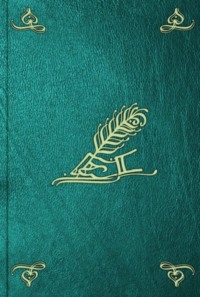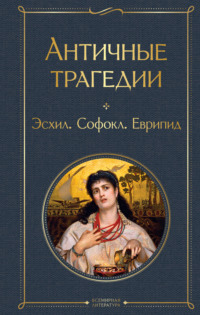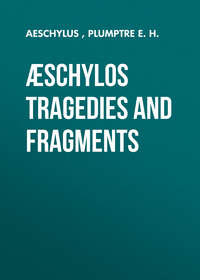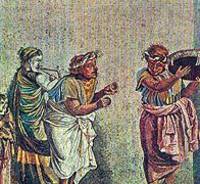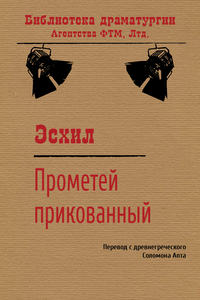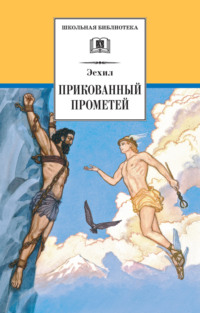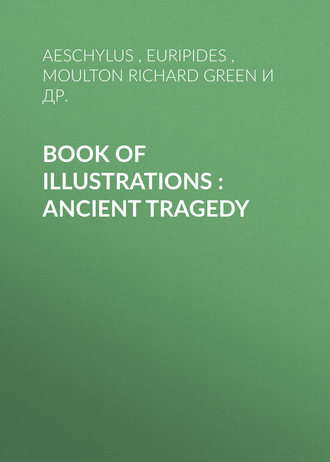 полная версия
полная версияBook of illustrations : Ancient Tragedy
Clyt. Now they will believe me, who were saying just now that women believed too soon. What joy for a wife equal to that of a husband's return? and I have kept my trust as stainless as bronze. [Exit into Palace.] The Foreman goes on to enquire as to Menelaus: the Herald would fain not answer, and brings out the Greek dread of mingling bad news with good – at last he is forced to acknowledge Menelaus has disappeared, his ship sundered from the fleet by a terrible storm in which
They a compact swore who erst were foes, Ocean and Fire, {634}and the sea 'blossomed with wrecks of ships and dead Achaeans:' the fleet itself barely escaped. [Thus: foreboding indirectly assisted by its appearing that one of the two sons of Atreus has already been overtaken by Nemesis.] {663}
CHORAL INTERLUDE II[Positions, etc., as before.]
Strophe I: to the Right.
Who could foresee so well and give her the name Helen– a Hell3 to men and ships and towers? She came out of bowers of gorgeous curtains, she sailed with breezes soft as Zephyrs yet strong as Titans, and unseen reached the leafy banks of the Simois; but bloodshed was in her train, and on her track followed hosts of hunters that carried shields. {680}
Antistrophe I: back to Altar.
So there is a wrath that works vengeance after long waiting: to the Ilion that received her she was a dear bride: then there was a shout of 'Paris, Paris,' in the Bridal Song: now his city has celebrated a Wedding of Death, and called on Paris' name in other tones. {695}
Strophe II: Altar to Left.
So once a lion's cub, A mischief in his house, As foster child one reared, While still it loved the teats; In life's preluding dawn Tame, by the children loved, And fondled by the old, Oft in his arms 'twas held, Like infant newly born, With eyes that brightened to the hand that stroked, And fawning at the hest of hunger keen. {704}Antistrophe II: back to Altar.
But when full-grown, it showed The nature of its sires; For it unbidden made A feast in recompense Of all their fostering care, By banquet of slain sheep; With blood the house was stained, A curse no slaves could check, Great mischief murderous: By God's decree a priest of Ate thus Was reared, and grew within the man's own house. {715}Strophe III: Altar to Right.
So I would tell that thus to Ilion came Mood as of calm when all the air is still, The gentle pride and joy of kingly state, A tender glance of eye, The full-blown blossom of a passionate love, Thrilling the very soul; And yet she turned aside, And wrought a bitter end of marriage feast, Coming to Priam's race, Ill sojourner, ill friend, Sent by great Zeus, the God of host and guest — Erinnys, for whom wives weep many tears. {726}Antistrophe III: back to Altar.
The time-honored saying is that Prosperity grown big will not die childless, its offspring will be a Woe insatiable. I say no, it is not the Prosperity, it is an Impious deed that breeds Impious deeds like the parent stock. {737}
Strophe IV: from Altar to Left.
Recklessness begets Recklessness, this begets full-flushed Lust and
Godforgetting Daring, two black curses to a household. {746}
Antistrophe IV: back to Altar.
Justice will dwell in houses blackened with smoke where life is ruled by law, but averts her eyes from gold-decked mansions conjoined with hands denied: and it is this Justice that is directing the course of things to its appointed goal. {755}
At this point, a grand Procession of the returning Warriors from Troy enters Stage and Orchestra by the Left Side-Door (signifying distance): Agamemnon in his chariot, followed in another chariot by Cassandra as captive, but still in the garb of prophetess: then a train of Soldiers laden with trophies and leading a train of Troïan captive women. The Chorus fall into their Episode position to receive them.
EPISODE IIIChorus (in marching rhythm as the Procession traverses the long Stage.)
Son of Atreus, how are we to hit upon welcome that shall be fit for thee, not missing or overshooting the mark? In both condolence and congratulation men's faces often belie their hearts; thou who knowest thine own sheep, should'st be able to tell kindness from flattery. We confess, when thou wentest forth on thy expedition, thou wast to us like a face limned by an unskilled artist, in the deed thou did'st to inspire false courage. Now, without a thought unfriendly, we say – all is well that ends well, and thou wilt soon hear who has deserved well of thee in thy absence. [Observe their guarded tone.] {782}
Agamemnon [the metre now settling into ordinary 'Blank Verse']. First thanks to the Gods by whose help we have laid Troy low, the ruins of which are still sending up clouds of smoke as sweet incense to the Deities of Vengeance. And your sentiments, both then and now, I approve: prosperity too often misses true sympathy amidst the envy it excites; envy that has the double pang of missing its own and seeing another's good. Experience has taught me the difference between professing and true friends: my unwilling comrade Ulysses alone proved true to me. As to the state we will deliberate in full counsel as to what needs preserving, and where disease calls for surgery. At present I must give thanks at my own hearth for my safe return.
Here the Central Door of the Stage is thrown open, and enter Clytaemnestra to welcome her lord, followed by attendants bearing rich draperies of purple and dazzling colors. {827}
Clyt. Notwithstanding your presence, Senators of Argos, I must pour out my heart to my lord. Ah! a sad thing is a wife waiting at home for her absent husband! hearing of wounds, which if true would have made you a riddled net, of deaths enough for a three-lived Geryon: again and again I have been stopped with the noose already on my neck! This is the reason why you see not your son Orestes: wonder not, he is being brought up by an ally to whom I sent him, lest danger befall us. I cannot weep; my tears have run dry by my weepings and sleepless watchings for the beacon. Now at ease I hail my lord —
as watch-dog of the fold, The stay that saves the ship, of lofty roof {870} Main column-prop, a father's only child, Land that beyond all hope the sailor sees, Morn of great brightness following after storm, Clear-flowing fount to thirsty traveller.The bare ground is not fit for the foot that has trampled on Ilion: strew (to Attendants) tapestry on the floor as the Conqueror steps from his car. The Attendants commence to lay down the draperies: Agamemnon (hastening to stop them) rebukes Clytaemnestra for the excessive tone of her welcome, and bids her not make him offensive to the Gods, by assuming an honor fit for the Gods alone, no man being safe in prosperity till he has died; fame, not foot-mats, and never to lose the path of Wisdom, are his glories. A contest ensues [the false Clytaemnestra anxious to entangle him in an act of Infatuation]; at last he yields, but removes the shoe from his foot, to avert the ill omen of such presumptuous display. He then commends the captive Cassandra to the Queen's kind treatment, and Clyt. renews her lofty expressions of joy: there is a store of purple in the palace, and many such robes would she bestow to welcome his return, the root of the household bringing warmth in winter and coolness in the dog-days. Ah! may Zeus work out for me "all that I wish for." [So Exeunt: Ag. walking barefoot on the rich tapestry. Cassandra alone remains on the Stage in her chariot.] {949}
CHORAL INTERLUDE IIIStrophe I: to the Right.
Why is it that forebodings haunt the gate of our hearts, and we lack steadfast trust to fling them away as visions? It is not long since that fatal starting for Troy, {959}
Antistrophe I: back to Altar
and now we have seen with our own eyes the safe return: and yet our mind, self-taught, keeps chanting within itself a dirge of fate. These inner pulses cannot be in vain: heaven send they prove false oracles! {971}
Strophe II: to the Left.
When Wealth o'erflows, Restlessness, as a near neighbor with only a wall between, presses it on with perpetual desire for more, till Prosperity strikes suddenly on an unseen rock – yet even then, by sacrificing a portion of the cargo, the rest may be saved; so by plenteous harvests sent from Zeus, hunger and pestilence may be allayed: {986}
Antistrophe II: back to Altar.
but when blood has once been poured upon the ground, what charm can bring it back? Zeus struck dead the Healer who found how to restore life. I would give my misgiving relief in pouring out words of warning: but I know that fate is certain and can never be escaped; so I am plunged in gloom, with little hope ever to unravel my soul that burns with its hot thoughts. {1001}
EXODUS, OR FINALERe-enter Clytaemnestra to fetch Cassandra. Clyt. addresses Cassandra in moderate tone, bidding her adapt herself to her new life and yield to those who wish to soften her captivity. [Cassandra pays no attention and seems gazing into vacancy.] The Chorus endorses Clytaemnestra's advice. At length it occurs to Clytaemnestra that Cassandra cannot speak Greek, and she bids her give some sign. [No sign, but a shudder convulses her frame.] Thinking she is obstinate Clytaemnestra will wait no longer [exit Clyt. into Palace to the sacrifice]. The Chorus renew their advice to Cassandra: She at length leaves the chariot and suddenly bursts into a cry of horror. {1038}
Then follows, marking the crisis of the drama, a burst of lyrical excitement. The dialogue between Chorus and Cassandra falls into lyrical strophes and antistrophes: Cassandra, by her prophetic gift, can see all that is going on and about to be consummated within the Palace. Her wailings reproach her patron and lover Apollo, who has conducted her to a house of blood; she sees the past murders that have stained the house, she sees the preparations for the present deed, the bath, the net, the axe; then her wailings wax yet wilder as she sees that she herself is to be included in the sacrifice. Meantime her excitement gradually passes over to the Chorus: at first they have mistaken her cries for the ordinary lamentations of captives (and borne their part in the dialogue in the ordinary 'blank verse'); then their emotions are roused (and their speech falls into lyrics) as they recognize the old woes of the family history and remember Cassandra's prophetic fame; as she passes to the deed going on at the moment they feel a thrill of horror, but only half understand and take her words for prophecy of distant events, which they connect with their own forebodings; thus in her struggles to get her words believed Cassandra becomes more and more graphic in her notices of the scene her mental eye is seeing, and the excitement crescendoes until: {1148}
As if the crisis were now determined the dialogue settles down into 'blank verse' again. Cassandra ascends from Orchestra to Stage. She will no longer speak veiled prophecy: it shall flow clear as wave against the sunlight. She begins with the Furies that never quit the house since that primal woe that defiled it – as she describes this the Chorus wonder an alien can know the house's history so well —Cassandra lets them know of her amour with Apollo, and how she gained the gift of prophecy and then deceived the God and was doomed to have her prophecies scorned. – Continuing her vision she points to the phantom children, 'their palms filled full with meat of their own flesh,' sitting on the house: in revenge for that deed another crime is this moment about to stain further the polluted dwelling, a brave hero falling at the hands of a coward, and by a plot his monster of a wife has contrived. – The Chorus still perplexed, Cassandra NAMES Agamemnon, the Chorus essaying vainly to stop the ill-fated utterance. – Then Cassandra goes on to describe how she herself must be sacrificed with her new lord, a victim to the jealous murderess; bitterly reproaching Apollo, she strips from her the symbols and garb of her prophetic art, which the god has made so bitter to her, and moves to the 'butcher's block,' foretelling how the Son shall come as his father's avenger and hers. – The Chorus ask, why go to meet your fate instead of escaping? Cassandra knows Fate is inevitable. – Again and again she shrinks back from the door, 'tainted with the scent of death;' then gazing for the last time on the loved rays of the Sun, and invoking him as witness and avenger, she abandons herself to her doom.
Ah, life of man! when most it prospereth, {1298} It is but limned in outline; and when brought To low estate, then doth the sponge, full soaked, Wipe out the picture with its frequent touch.[Passes through the Central Door into Palace.]
The Chorus (in lyrical rhythm). It is true good fortune can never be fended from the visitation of evil, which no strong palace can bar out. What will it avail Agamemnon to have taken Troy and come in honor home, if it be really his destiny to pay the penalty of that old deed of bloodguiltiness? {1313}
(Here a loud cry is heard from within the Palace.)
The Chorus recognize the voice of the King, and fear the deed is accomplished. In extreme excitement the Chorus break up, and each member, one after another, suggests what is to be done; at last they compose their ranks to learn what has actually occurred. {1342}
Suddenly, by the machinery of the Roller-stage [Eccyclema], the interior of the Palace is moved to the front of the Stage, and discovers Clytaemnestra in blood-stained robes, standing with attendants by the corpses of Agamemnon and Cassandra, the former lying in a silvered bath covered with a net.
Clytaemnestra, in an elaborate speech, glories in her deed. Deceit was necessary in dealing with foes: now standing where she did the deed, she glories in it: glories in the net in which she entangled and rendered him powerless, in the blows, one, two, three, like a libation, which she struck, glories in the gush of death-blood which has bespattered her. A late triumph: he had come home to drain the goblet of curses his old deed had been long heaping up. After an interruption of astonishment from the Foreman, she repeats: it is the handiwork of my artist hand. After the Chorus have recovered from their astonishment they (in a lyrical burst) denounce her: her confession is the incense on the Victim's head, she shall feel the people's strong hate, and have an exile's doom. —Clyt. (calmly in Blank Verse): they denounced no such exile against Agamemnon when he sacrificed her daughter, the first of her travail pangs. Besides, are they sure they are the stronger? Perchance, though old, they may yet have to learn. —Chorus (in a similar lyrical burst): she is now maddened with the spirit of vengeance, but she will one day find a nemesis, blow for blow. Clyt. solemnly (in Blank Verse) swears by the deed she has done, and the curse for which she did it, she has no fear of Nemesis, as lone as Aegisthus is her shield. Meanwhile, there they lie: the wife-wronger and his mistress. {1377}
Then follows an elaborate lyrical scene: the Chorus giving vent to their excitement in Strophes and Antistrophes irregularly succeeding one another, Clytaemnestra occasionally joining in. O for death, sudden and without lingering, now that our beloved Protector is gone! Ah! Helen! one more deed of woe to your account! —Clyt. No need to wish for death or upbraid Helen. —Cho. (interrupting) O dread Power that dost attack this household, working even through women deeds of dread! —Clyt. Now thou art right: it is the Evil Genius of the House that feeds in their hearts the lust of blood; bringing fresh blood-guilt ere the old is healed. —Cho. Yes, there is a Power wrathful to the House; but it must be through Zeus he works; what amongst mortal men is wrought apart from Zeus?
Ah me! Ah me! {1467} My king, my king, how shall I weep for thee? What shall I speak from heart that truly loves? And now thou liest there, breathing out thy life, In impious deed of death, In this fell spider's web! Yes woe is me! woe, woe! Woe for this couch of thine unhonorable! Slain by a subtle death With sword two-edged, which her right hand did wield.Clyt. You speak of me as the doer: it was the Avenger of the seed of Atreus who did the deed in the semblance of this dead man's wife. —Cho. None will hold thee guiltless of the deed; yet, perchance, thou mayest have had as helper the avenging Fiend of that ancestral time; he presses on this rush of murders of near kin.
Ah me! Ah me! My king, my king, how shall I weep for thee? What shall I speak from heart that truly loves? And now thou liest there, breathing out thy life, In impious deed of death, In this fell spider's web! Yes woe is me! woe, woe! Woe for this couch of thine unhonorable! Slain by a subtle death With sword two-edged, which her right hand did wield.Clyt. This deed brings no dishonor to me: he slew my daughter and his own, wept over with many a tear; now slain in recompense he is gone to Hell with nothing to boast over. —Cho. Whither escape from this House? No longer drops, but fierce pelting storm of blood shakes it to its basement. —Cho. Oh that earth had received me ere I saw this sad sight! Who will perform funeral rites and chant the dirge? Wilt thou who hast slain dare to mourn him? —Clyt. It is no care of thine: we will give him burial; and for mourning – perhaps Iphigenia will greet him kindly by the dark streams below. —Cho. Hard it is to judge; the hand of Zeus is in all this; ever throughout this household we see the fixed law, the spoiler still is spoiled. Who will drive out from this royal house this brood of curses dark? —Clyt. Thou art right; but here let the demon rest content; suffice it for me that my hand has freed the house from the madness that sets each man's hand against each. [Observe: in this last infatuated confidence and throughout Clytaemnestra's exultation in the deed the dramatist is laying the foundation for the second play of the Trilogy.] {1534}
Enter Aegisthus by one of the two Inferior doors in front of the scene [representing the inferior parts of the Palace in which he has been concealed since the return of Agamemnon].
Aegisthus salutes the happy day of vengeance which shows him Agamemnon paying penalty for the deeds of his father: he relates the quarrel between this father Atreus and his own father Thyestes, how when the one brother came as suppliant to the other Atreus spread before him the horrid banquet of his own child's flesh, at the knowledge of which he died. Aegisthus himself had suffered banishment at the hands of Atreus while yet a child, and now has returned full grown to work vengeance on the son of his wronger, to see the long contrived nemesis brought to full conclusion. —Chorus note that he confesses the deed, and he shall not escape the righteous curse a people hurls with stones. —Aeg. Know your place: you are oarsmen, we command the ship; prison and fasting are admirable devices for helping old people to keep their tempers within bounds. Defiances are interchanged: the Chorus taunting him that he had to get a woman to do the deed he dared not do himself, —Aeg. contemptuously says the working out of the fraud was the proper province of a woman, especially as he was a known foe. – The Chorus threaten vengeance and suggest the name ORESTES as avenger: At this Clytaemnestra starts, Aegisthus enraged gives the signal at which {1626}
Bodyguard of Aegisthus pour in through both the Inferior doors on either side of the Central door of the Palace, and fill the stage [thus producing one of the Scenic Tableaux of which Aeschylus was fond]. The Chorus, though of course outnumbered, are nothing daunted, as representing the legitimate authority of the State now Agamemnon is dead, and therefore sure to be backed by the City; they make as if to ascend the stage.
Contest in blows between Chorus and Bodyguard of Aegisthus appears inevitable, but Clytaemnestra throws herself between them, urges that enough ill has already been done, and after further defiances, forces Aegisthus away and play abruptly terminates: the Chorus returning to the Right into the City, and the Bodyguard into the Palace.
SECOND PLAY: MIDDAY:
THE SEPULCHRAL RITES
(CHOEPHORI)
PROLOGUEThe Permanent Scene, as before, represents the Palace of Agamemnon at Argos. The only difference is that the place of the Thymele in the centre of the Orchestra is taken up by Agamemnon's Sepulchre. Enter by the Left Side-door (signifying distance) Orestes and Pylades, and descending the Orchestra-staircase advance to the Sepulchre.
Orestes, invoking the Conductor of the Dead, lays locks of hair and fragments of garments as offerings on his Father's tomb, cut off as he had been by exile from being present at the actual Funeral-rites:
He is interrupted by the opening of one of the Inferior Doors of the Palace, out of which comes Electra, and a train of Trojan Captive-maidens bearing urns of libations, all with dishevelled hair and the well-known gestures proper to Sepulchral rites. They descend (with the exception of Electra) the Orchestra-staircase, and perform a Choral Ode with funeral rhythm and gestures. Orestes and Pylades, recognizing them, stand aside. {19}
SEPULCHRAL ODE AS CHORUS-ENTRYin three Strophes, Antistrophes, and an Epode,
describes in words the tearings of cheeks, rending of garments, and groans, which are actually the gestures of their dance, and are proper to a Sepulchral rite such as they have been sent to perform by their Queen, terrified as she has been by a dream the night before, a dream signifying how the Dead were wroth with those that slew them. But the Chorus like not this graceless deed of grace: what ransom can be found for the overthrow of the lord of a house? with him Awe has been overthrown, and Fear takes its place, or yet more Success is God. {53}
Yet stroke of Vengeance swift Smites some in life's clear day; For some who tarry long their sorrows wait In twilight dim, on darkness' borderland; And some an endless night Of nothingness holds fast.Yes: for blood once spilt, for the marriage tie defiled, there is no remedy – yet the Chorus must, as part of their bitter captive lot, perform the rite they have no heart in. {75}
Through this Ode Electra, who ought to have taken the lead, has stood on the stage irresolute: she now addresses the Chorus, who at her word fall into their Episode positions.
EPISODE IElectra puts to the Chorus the same difficulty they have been feeling:
What shall I say as these funereal gifts I pour? How shall I speak acceptably? How to my father pray? What? shall I say "I bring from loving wife to husband loved Gifts" – from my mother? No, I am not bold Enough for that, nor know I what to speak, Pouring this chrism on my father's tomb: Or shall I say this prayer, as men are wont, "Good recompense make thou to those who bring These garlands," yea, a gift full well deserved By deeds of ill? Or, dumb with ignominy Like that with which he perished, shall I pour Libations on the earth, and like a man That flings away the lustral filth, shall I Throw down the urn and walk with eyes not turned? {97}The Chorus-Leader breaking ranks to lay her hand on the Sepulchre as sign of fidelity, advises to throw off all disguise and pray boldly for friend and against foe. Electra in this sense offers the Prayer: setting forth the wrongs of the house and praying for Orestes and Vengeance: then calling on the Chorus for a Sepulchral Song she descends to the tomb. {144}


